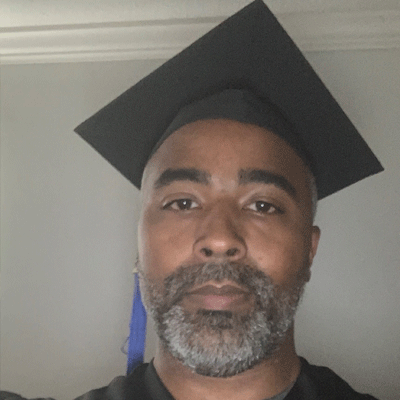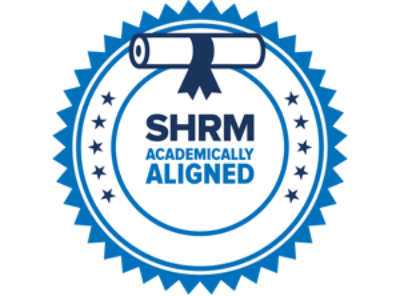Learn to discover and retain top talent
Request Information
Your privacy is important to us. Privacy Policy
We're Sorry
There was an unexpected error with the form (your web browser was unable to retrieve some required data from our servers). This kind of error may occur if you have temporarily lost your internet connection. If you're able to verify that your internet connection is stable and the error persists, the Franklin University Help Desk is available to assist you at helpdesk@franklin.edu, 614.947.6682 (local), or 1.866.435.7006 (toll free).
Just a moment while we process your submission.
Earn an accredited + affordable B.S. in Human Resources Management
With Franklin's online Human Resources Management bachelor's degree program, you'll learn to execute key functions in HR and understand essential candidate analysis techniques, compensation models, and training skills.
Credentialed practitioners and respected experts in human resources teach our relevant curriculum, so you’ll learn real-world lessons from their years of experience. Plus, you'll find plenty of opportunities to network with fellow HR students and professionals in the field.
A Top-40 Best
Study HR from a program ranked "best" by College Choice.
Finish Faster
Transfer up to 94 previously earned college credits.
SHRM-Aligned Curriculum
Learn relevant theory and recommended HR practices.
Real-World Practitioners
Benefit from the teaching and experience of HR professionals.
Bachelor’s + Master’s
Use the combined programs option to save time and money
IACBE Accredited
Our program follows best-practice standards for business education.
100% Online Classes
Take classes that fit with your busy life.
Networking Opportunities
Build contacts and enhance your professional development.
Hear What Our HR Graduates Are Saying

"It's a great feeling to accomplish this goal and set an example for my son."

"Franklin's course format helped me because the assignments were laid out for me and organized. I knew what I needed to complete and by when. It helped me with my time management and helped me to be successful."

"I’m over the moon and it feels so fantastic that words can’t describe it."

"This accomplishment has brought a sense of pride as well as confidence that I can do anything I set my mind to."

"It was important for me to feel supported during my education. The 3+1 transfer program exceeded by expectations."

"Graduating college with a bachelor's degree has been a lifelong dream of mine. I am so grateful to Franklin University for helping to make my dream come true!"

"Having this education from Franklin has really allowed me to be the successful, professional I am today and without it, I would not be where I am today for sure."

“Receiving my degree is one of the happiest moments of my life, as it solidifies the hard work and time dedicated to achieving this throughout these years. I now look forward to the future and opportunities ahead of me.”
B.S. in Human Resources Management Courses
In this course, students acquire the writing competencies necessary for completing analytical and argumentative papers supported by secondary research. A variety of assignments, beginning with personal reflections, build upon one another, as students develop ideas that respond to, critique, and synthesize the positions of others. Students systematize and organize knowledge in ways that will help them in all their courses. The course also emphasizes the elements of critical reading, effective writing style, appropriate grammar and mechanics, clarity of language, and logical and cohesive development. It culminates in submission of an extended, documented research paper.
This course introduces you to statistics with applications to various areas. The course covers both descriptive and inferential statistics. Topics included are: sampling techniques, data types, experiments; measures of central tendency, measures of dispersion, graphical displays of data, basic probability concepts, binomial and normal probability distributions, sampling distributions and Central Limit Theorem; confidence intervals, hypothesis tests of a mean, or a proportion for one or two populations, and linear regression.
AND
Choose either MATH 140 Introduction to Quantitative Reasoning or MATH 150 Fundamental Algebra as the prerequisite. Course can count as a University elective.
An introduction to economic theory involving the basic underlying causes and principles of the operation of an economic system. Emphasis is placed on studying the economy as a whole. Issues of inflation, unemployment, taxation, business cycles and growth are discussed in the context of the global economic system.
AND
2 credits from the following types of courses:
Choose from the Anthropology, Geography, History, Political Science, Psychology, or Sociology disciplines.
6 credits from the following types of courses:
Two courses from the Science discipline. One course must have a lab component.
6 credits from the following types of courses:
Choose from the Art, English Literature, Fine Arts, Humanities, Music, Philosophy, Religion or Theater disciplines.
This course prepares students to be successful lifelong learners both academically and in their chosen careers. Franklin courses require a high level of self-directed learning and focus on the skills required in the workplace and the classroom that are easily transferrable between the two environments. The course includes strategies for time management, goal setting, reading comprehension, and advancing communication skills, including the use of electronic tools to participate in virtual environments.
This course prepares students to be successful lifelong learners both academically and in their chosen careers. Franklin courses require a high level of self-directed learning and focus on the skills required in the workplace and the classroom that are easily transferable between the two environments. The course includes strategies for advancing communication skills, including the use of electronic tools to participate in virtual environments. The assignments and activities in the course are created to closely simulate teamwork found in the workplace.
AND
By using applied critical and creative thinking, students in this course will develop a set of communication skills that will enhance their personal and professional relationships and endeavors. This course will focus on skill development in key areas such as self, perception, listening, verbal messages, conversations, relationships, conflict management, persuasion, and presentation skills.
This basic public-speaking course intends to improve the student's ability to think critically and to communicate orally. Theory and practice are provided in various speaking situations. Each student is required to speak before an audience, but class work also involves reading, gathering and organizing information, writing, and listening.
AND
This is an advanced composition course focusing on writing for business and professional purposes. Students will review the writing conventions commonly expected within business and professional environments, as well as strategies for analyzing rhetorical situations within those environments. Coursework includes analysis, revision, and research exercises, as well as substantial practice in composing business correspondence. The final project is an extensive, researched business proposal developed in stages and presented to the class. Students will be encouraged to relate course materials to their major programs and workplace experiences.
This course is an introduction to financial and managerial accounting. It is designed for non-accounting majors. Financial accounting emphasizes how general purpose financial statements communicate information about the business's performance and position for users external to management. It emphasizes how the accountant processes and presents the information. The course also examines the major elements of the financial statements. The managerial accounting portion of the course studies internal reporting and decision-making. The course assists those who wish to learn "what the numbers mean" in a clear, concise and conceptual manner without focusing on the mechanical aspects of the accounting process.
A study of the everyday legal problems encountered in business with emphasis on the areas of legal procedure, contracts, agency, employment law, business organizations and torts, with cases relating to these and other areas.
An introduction to economic theory involving the examination of how decision making by firms and individuals is shaped by economic forces. Emphasis is placed on demand, supply, market equilibrium analysis, and basic market structure models. The invisible hand as the driving force for economic decisions as well as market externalities are discussed. The class concentrates on providing a balanced approach to studying economic agents' behavior and the global implications and outcomes.
This course is designed to survey the field of finance and provide the foundation for more advanced finance coursework. Topics include sources of business and financial information, financial statement analysis, the time value of money, the nature and measurement of risk, financial institutions, investments and corporate finance.
This course explores the basic concepts and processes of management. Students will explore the functional roles and processes of planning, leading, organizing, and controlling comprising the manager role. Students develop skills related to the manager function that are required in today's competitive environment.
Theory, strategies and methods are foundational to the informed practice of marketing. Students investigate the importance of marketing to an organization or cause, the interrelationship of the difference phases of marketing, the marketing of goods versus services, analysis and identification of markets, pricing strategies and digital marketing tactics.
AND
Completion of ACCT 215 - Financial Accounting & ACCT 225 - Managerial Accounting can fulfill the ACCT 202 requirement.
This course is an introduction to the human resources function and related elements and activities. The course outlines the roles and functions of members of the human resources department, as well as educating others outside human resources, in how their roles include human resources-related activities. The student will learn about the evolution in human resources management as we know it today. Emphasis is placed on the modern day importance of HRM and the new ?corporate view? of the function. Additionally, the student will be exposed to the view of HRM from the perception of both management and subordinate employees. The importance of maintaining fair and equitable compensation and benefit programs will be discussed. The student will be exposed to practical situations and problem solving regarding areas of employee counseling, discipline, and termination. Equal Employment Opportunity will be discussed in order for the student to understand its need, importance, and the legal issues surrounding it. Other critical areas of training and development, staffing, and strategy will also be explored.
This course examines all aspects of getting employees into organizations. Recruitment and selection are the foci. This course covers scientific and legal issues from a managerial perspective and examines the usefulness of various methods used in job analysis, testing and measurement, and internal and external market analysis. Legislation regarding EEO and affirmative action programs are discussed.
This course covers the theories and techniques of training and development from strategic and operational perspectives. Emphasis is placed on employee needs assessment, program design, implementation and evaluation. Learning theories and long-term development for global competitiveness are discussed.
This course is an in-depth examination of pay and benefit theories and practices. The course analyzes job evaluation techniques, salary surveys, individual and group performance-based pay, as well as insurance and pension plan administration.
This course evaluates the current environment of employee and labor relations. Students will compare and distinguish the differences between employee relations and labor relations environments. Topics such as handbooks versus contracts, employee discipline versus grievance procedures, and workplace compliance laws, such as ADA, FMLA, sexual harassment, and the Civil Rights Act are discussed.
Capstone course for HRM majors. Investigates the strategic management process from the HR perspective. Topics include strategic HR, strategic alignment, balanced scorecard and competitive strategic analysis. Intensive use of case analysis, including a cross-functional senior practicum with students from Finance, Marketing and Management Information Systems majors.
At least 4 credits from the following courses:
This course focuses on the development of individual and team decision-making and problem solving skills. Real world domestic and global issues will be analyzed, diagnosed, and evaluated through the application of a variety of quantitative and qualitative tools and techniques used to arrive at effective decisions and solutions.
This course focuses on global economic integration and emerging market economies and the effects these trends have on both service and manufacturing industries in the short- and long-term. Other global business issues will include: the European Union (EU), North American Free Trade Association (NAFTA), and the World Trade Organization (WTO); environmental considerations in business operations; the influences of the political and legal environment on markets; the strategies for business entry into a global market; and the development of leadership talent in a global setting.
Foundations of Entrepreneurship is an introductory course that examines the theory, practice, and tools of entrepreneurship. Various entrepreneurship structures and how such structures result in different unique pathways to success are explored. Students will focus on the importance of developing an entrepreneurial mindset as they assess their individual values and determine their affinity for entrepreneurial thinking, while also reviewing the risks and rewards of entrepreneurial businesses in the context of their chosen entrepreneurial philosophy. Finally, students will identify and evaluate opportunities for new ventures, and consider a strategic approach for successful business plan development.
This course uses a systems perspective to identify, select, develop, and evaluate solutions to document and improve the performance of individuals, groups, and organizations. Students will learn how to analyze performance problems and make recommendations at the employee, job, and organizational level that will assist the organization and its employees in achieving organizational goals and managing change. Students will also learn how to bridge the gap between organizational strategy, individuals, and departments.
This course provides students with an overview of the emergence and development of organizational development as a field, processes for diagnosis and intervention, and basic skills needed to facilitate individual, small group, and organizational change. The course will also cover key concepts in organizational transformation, organizational development in global settings, and future directions in the field.
This course focuses on the organizational processes and theoretical constructs related to organizational behavior. The roles of leaders, followers, and teams, and their influence on the culture and performance of an organization are addressed through the analysis of key organizational behavior concepts and related cases. Topics will include: values, perception, attitudes, assumptions, learning, motivation, conflict, diversity, and change.
This course is designed to introduce students to the use of coaching skills for improving the adjustment and performance of individuals in an organizational setting. Topics to be covered include: the scope of coaching practice, optimal practitioner characteristics, benefits for coaches, related organizational dynamics, and coaching interventions and resources. This course also includes an emphasis on experiential learning through coaching practice activities.
This introductory course focuses on applying information technology to business strategies using databases. The student will gain a working knowledge of current database technology, including relational database concepts, database design, data extraction, and data warehousing while working with database applications.
This course introduces the fundamentals of Business and Data Analytics. Students will learn business problem framing, data wrangling, descriptive and inferential statistics, data visualization, and data storytelling in analytics.
36 credits from the following types of courses:
Any undergraduate courses offered by the University except developmental education courses.
All students are required to pass College Writing (ENG 120), and either Basic Learning Strategies (PF 121) or Learning Strategies (PF 321) prior to enrolling in any course at the 200 level or above. Students who enroll at Franklin with 30 or fewer hours of transfer credit are required to pass PF 121 Basic Learning Strategies in place of PF 321 Learning Strategies. Interpersonal Communication (COMM 150) or Speech Communication (SPCH 100) must be taken prior to enrolling in any course at the 300 level or above. Students must also meet the University algebra competency requirement.
B.S. in Human Resources Management Program Details
| 2024 - 2025 Tuition | Cost Per Credit |
|---|---|
| Standard tuition | $398 |
| B.S. in Nursing | $298 |
| Current service members | $250 |
| International students (Nonresident Alien) | $526 |
See How Franklin Compares
67% LESS IN TUITION
For students taking 31 credits per year, Franklin University’s undergraduate tuition for the 2023-2024 academic year is $12,338. According to Collegeboard.org, that's about 67% less than the national average private, nonprofit four-year college tuition of $38,070.
A learning outcome map functions as a roadmap to help guide students' progress through their program of study. Click HERE to view the B.S. Human Resource Management matrix.
1. To be awarded an undergraduate degree, students must:
- Successfully complete all courses required in the major program, including:
- General Education
- Business or Professional Core
- Major Area and Elective Courses
- Technical transfer credit (for specific degree completion programs only)
2. Meet these grade point average (GPA) requirements:
- All students must attain a minimum Franklin University cumulative GPA of 2.00
- All students must attain a minimum GPA of 2.25 in the major area, and each major area course must be completed with a grade of “C” or better to count toward degree requirements
3. Complete the residency requirement
- Students seeking a bachelor’s degree must complete a minimum of 30 credit hours at Franklin University to be eligible for a degree. Students seeking an associate’s degree must earn 20 credit hours overall in residence at Franklin University to be eligible for a degree.
4. Complete the payment of all requisite tuition and fees
5. Not be under disciplinary dismissal due to academic dishonesty or a violation of the Student Code of Conduct
Program Chairs and Academic Advisors are available for consultation to provide information and guidance regarding the selection of courses, the accuracy of schedules, and the transfer process. However, students are responsible for understanding and meeting the degree requirements of their major program or degree and for planning schedules accordingly.
Overall Residency Requirements
Students seeking a bachelor’s degree must complete a minimum of 30 credit hours at Franklin University to be eligible for a degree. Students seeking an associate’s degree must earn 20 credit hours overall in residence at Franklin University to be eligible for a degree.
Course Level Requirements
A student must have 40 credit hours overall that are equivalent to 300/400 level Franklin University courses for a bachelor’s degree. A student must have a minimum of 12 credit hours of courses that are equivalent to 200 level or above for an associate’s degree.
Business Core Requirements
Majors that have Business Core requirements are Accounting, Applied Management, Business Administration, Business Economics, Business Forensics, Energy Management, Entrepreneurship, Financial Management, Financial Planning, Forensic Accounting, Human Resources Management, Information Systems Auditing, Logistics Management, Management & Leadership, Marketing, Operations & Supply Chain Management, and Risk Management & Insurance. The Business Core is the foundation of the related academic disciplines appropriate for a baccalaureate degree in business. The purpose of the Business Core is to provide students with a conceptual understanding of organizations, how the functional areas interrelate to achieve organizational goals, and how to apply professional decision-making competencies and technical skills in today’s environment. After completing the Business Core, graduates will be able to:
- analyze an organization’s accounting information in order to develop sound business decisions
- identify and apply valuation models relevant to an organization’s financial decisions
- identify the impact of forces influencing the major functional areas of business (e.g., ethical, legal, technological, economic, global and social)
- apply marketing activities to the delivery of goods and services in business-to-business and business-to-consumer markets
- apply interpersonal and resource management skills to enhance business success
Business Principles (BSAD 110) is a Business Core prerequisite. Transfer students with the equivalent of four business courses are not required to take Business Principles.
Major Area Requirements
A student must have 20 credit hours in the major area that are equivalent to 300/400 major level Franklin courses for a bachelor’s degree. A student must have 12 hours of major area courses that are equivalent to 200 level or above for an associate’s degree. A minimum 2.25 GPA is required in the major area for students enrolled in either the associate’s or bachelor’s degree programs, and each major course must be completed with a grade of “C” or better to count toward degree requirements.
Capstone Requirement
Every major has a capstone experience for which credit cannot be transferred into the University. This is a Franklin course designed to integrate and assess the learning outcomes specific to each major as a whole. This course should be taken as the last major course. If, given the academic scheduling process and the student’s projected graduation date, this is not possible, then the student should have Senior Standing (90 or more credit hours), plus the skill-based General Education courses (COMM, SPCH, WRIT, MATH, COMP), all business or professional core courses, and the capstone prerequisite courses.
Subsequent Degree Requirements
Students pursuing subsequent bachelor’s degrees must earn in residency at Franklin University a minimum of 30 credit hours at the 200 level or above, of which a minimum of 16 credit hours must be major area courses equivalent to 300/400 level courses.
Additional Degree Requirements
Students seeking an additional bachelor’s (or associate’s) degree must successfully complete a minimum of 30 credit hours (including the major requirements) beyond the first bachelor’s (or associate’s) degree. (See the “Subsequent Degree” section of the Academic Bulletin.)
Transfer Credit
Transfer credit and credit awarded on standardized exams, proficiency exams or portfolio credit awarded by another institution will not count toward the residency requirement at Franklin University. Credit awarded based on proficiency examination or portfolio evaluation conducted by Franklin University may apply as appropriate major area credit, but will not reduce the hours required toward the residency requirement.
| Name | Organization | Title |
| Jon Umstead | Assurant | AVP, Strategic Growth & Business Development |
| Gary Stroud | Franklin University | Faculty (Retired) |
| Marian Jones | Wallick Companies | VP of HR |
| Carly Childress | Schoedinger Funeral and Cremation Services | HR Manager |
| Kim Shemenske | Design Group | Director of HR |
| Amber Cercone | BMI Federal Credit Union | HR Manager |
| Chris Rutter | Mount Carmel Health Systems | CHRO |
| Kim Campbell | Mount Carmel Health Systems | Director of Enrollment Management |
Ohio's Leader for Online HR Degrees

#1 Online Human Resources Degrees in Ohio
Franklin is Ohio's largest provider of online human resources degrees, including associate, bachelor's, master's and doctoral programs.1

#1 Online Business Degrees in Ohio
Franklin is #1 in Ohio across online bachelor's, master's and doctoral degrees conferred in the business fields.2

SHRM Aligned
The bachelor's in human resource management program fully aligns with the Society for Human Resource Management's (SHRM) HR Curriculum Guidebook and Templates.

International Accreditation Council for Business Education (IACBE)
The Ross College of Business at Franklin University has received specialized accreditation for its business programs through the International Accreditation Council for Business Education (IACBE) located at 11960 Quivira Road in Overland Park, Kansas, USA. For a list of accredited programs please view our IACBE member status page.
Click here to see our IACBE Public Disclosure of Student Achievement.
For more information about the International Accreditation Council for Business Education, please click here or visit www.iacbe.org.
Study When & Where You Want
Find a program that meets your busy life, thanks to online programs, after-work classes, and more.

Balanced Learning Approach
Our balanced learning approach equally allocates workload throughout the course to help you balance your study time with other commitments. And because our courses are fully detailed, week-by-week and assignment-by-assignment on the course website, you can plan your studies around your life - instead of the other way around.

Variable Course Lengths
Schedule classes that work for your busy life. Pick the class format that works best for your learning and lifestyle.

Multiple Start Dates
Start and finish faster -- and more conveniently -- with college classes that fit your life and schedule. Variable class start dates help you customize your schedule and keep things as interruption-free as possible.
About Franklin University

Dedicated to Helping Ambitious Adults Succeed Since 1902
Get the support you need to achieve your goals at Franklin. Our streamlined processes and easy access to free academic support resources, minimize the obstacles standing between you and your degree. Accredited, nonprofit and wholly focused on adult learners for more than 120 years, Franklin makes it possible for you to earn an employer-respected degree 100% online.
1National Center for Education Statistics (NCES) Integrated Postsecondary Education Database (IPEDS). Retrieved January 2024; includes 2018-2022 data for the human resources management classification of instructional programs (CIP) codes offered in distance format in Ohio.
2National Center for Education Statistics (NCES) Integrated Postsecondary Education Database (IPEDS). Retrieved January 2024; includes 2018-2022 data for the business classification of instructional programs (CIP) codes offered in distance format in Ohio.
- Degrees
- Microcredentials & Certificates
- Admissions
- Tuition & Financial Aid
- Transferring Credit
- The Franklin Experience
- About Us
- FranklinWORKS Marketplace
- Safety & Security
- Policy Information
- Your Privacy Settings
- Privacy Policy
- Terms of Use
- Careers At Franklin
- Sitemap
Franklin University
201 S Grant Ave.
Columbus, OH 43215
Local: (614) 797-4700
Toll Free: (877) 341-6300
admissions@franklin.edu
Copyright 2025 Franklin University
Franklin University is accredited by the Higher Learning Commission (hlcommission.org/800.621.7440) and authorized by the Ohio Department of Higher Education.
Franklin University is committed to being an inclusive community free from all forms of discrimination and harassment.
Your privacy is important to us. Privacy Policy